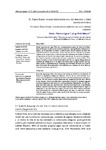Mostrar o rexistro simple do ítem
El Sumak Kawsay andino como resistencia sociopolítica y como desafío epistémico
| dc.contributor.author | Piñeiro Aguiar, Eleder | |
| dc.contributor.author | Polo Blanco, Jorge | |
| dc.date.accessioned | 2022-02-10T17:01:16Z | |
| dc.date.available | 2022-02-10T17:01:16Z | |
| dc.date.issued | 2021 | |
| dc.identifier.citation | Piñeiro Aguiar, Eleder & Polo Blanco, Jorge (2021). El Sumak Kawsay andino como resistencia sociopolítica y como desafío epistémico. Athenea Digital, 21(3), e2967. https://doi.org/10.5565/rev/athenea.2967 | es_ES |
| dc.identifier.issn | 1578-8946 | |
| dc.identifier.uri | http://hdl.handle.net/2183/29764 | |
| dc.description | Artigo e2967 | es_ES |
| dc.description.abstract | [Resumen] Desde comienzos del siglo XXI, pero principalmente a partir de 2006, en la Repú-blica del Ecuador se dejó sentir a nivel sociopolítico una significativa influencia in-dígena, que se manifestó en textos constitucionales, planes estatales de desarrolloy políticas públicas. Analizaremos ciertos insumos que han ofrecido los pueblosoriginarios en el país andino y que han supuesto elementos de resistencia frente ala hegemonía neoliberal y al desarrollismo extractivista. En concreto, examinare-mos cómo se han ido construyendo discursos y prácticas en torno al Buen Vivir(Sumak Kawsay) y cómo se articula semejante proceso con lógicas más globales deavanzada del indigenismo en la región latinoamericana. Comprobaremos qué sig-nifica, política y epistémicamente, la apuesta que el Ecuador ha hecho por dotar alpaís de derechos de la naturaleza y por definirse, por primera vez en su historia,como plurinacional y pluriétnico. | es_ES |
| dc.description.abstract | [Abstract] Since the beginning of the 21st century, but mainly as of 2006, in the Republic ofEcuador a significant indigenous influence was felt at the socio-political level,which was manifested in constitutional texts, state development plans and publicpolicies. We will analyze certain inputs that the indigenous peoples have offeredin the Andean country and that have represented elements of resistance againstneoliberal hegemony and extractive developmentalism. Specifically, we will exa-mine how discourses and practices have been built around Good Living (SumakKawsay) and how such process is articulated with more advanced global logics ofindigenism in the Latin American region. We will verify what it means, politicallyand epistemically, the commitment that Ecuador has made to endow the countrywith the rights of nature and to define itself, for the first time in its history, as plu-rinational and multiethnic. | es_ES |
| dc.language.iso | spa | es_ES |
| dc.publisher | Universitat Autònoma de Barcelona | es_ES |
| dc.relation.uri | https://doi.org/10.5565/rev/athenea.2967 | es_ES |
| dc.rights | Licenza Internacional Creative Commons Atribución 4.0. (CC BY) | es_ES |
| dc.rights.uri | http://creativecommons.org/licenses/by/3.0/es/ | * |
| dc.subject | Buen Vivir | es_ES |
| dc.subject | Desarrollo comunitario | es_ES |
| dc.subject | Ecuador | es_ES |
| dc.subject | Grupo étnico | es_ES |
| dc.subject | Sumak Kawsay | es_ES |
| dc.subject | Community development | es_ES |
| dc.subject | Ethnic group | es_ES |
| dc.title | El Sumak Kawsay andino como resistencia sociopolítica y como desafío epistémico | es_ES |
| dc.title.alternative | The Andean Sumak Kawsay as sociopolitical resistance and epistemic challenge | es_ES |
| dc.type | info:eu-repo/semantics/article | es_ES |
| dc.rights.access | info:eu-repo/semantics/openAccess | es_ES |
| UDC.journalTitle | Athenea Digital | es_ES |
| UDC.volume | 21 | es_ES |
| UDC.issue | 3 | es_ES |
Ficheiros no ítem
Este ítem aparece na(s) seguinte(s) colección(s)
-
GI-ESOMI - Artigos [128]






